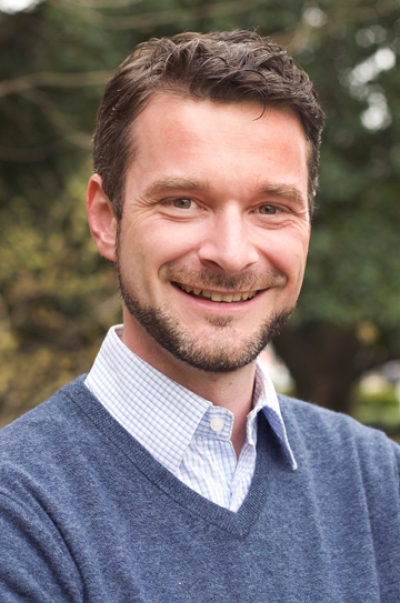Macroeconomist Matthias Kehrig Joins Duke Econ Faculty

Modern macroeconomists have begun to study how microeconomic units — specifically, consumers and firms — make decisions that can influence and shape macroeconomic outcomes. This trend emerged in the late 1990s and early 2000s as microeconomic data and increased computational power have become more widely available.
Macroeconomist and new Duke University professor Matthias Kehrig studies these microeconomic foundations — or, as he puts it, looks at the “microeconomic picture behind the macroeconomic outcomes.” His particular research interest focuses on how firms treat uncertainty, how firm-level differences shape aggregate outcomes, and how aggregate fluctuations in turn influence firm-level dynamics.
“Modern macroeconomists are now taking an inside look at economy-wide phenomena such as unemployment, inflation, and economic growth. There’s more behind the aggregate number that people see,” Kehrig said. “We need to understand what is actually driving the economy as a whole.”
One recent phenomenon Kehrig is hoping to explain is the growing gap between workers’ compensation and labor productivity. His current project with co-author Nicolas Vincent (HEC Montreal) examines the micro-level anatomy of the aggregate labor share decline. Historically, the labor share (labor compensation as a share of GDP) and the capital share were expected to hold constant, with about two-thirds of GDP accruing to workers and about one-third to capital. Since the 1980s, however, the aggregate labor share in most developed economies has in fact been in decline.
Researchers theorized that wages have declined because of globalization and technological advancements. But looking specifically at U.S. manufacturing, Kehrig and Vincent note that most proposed explanations are not supported for the labor share decline in this particular sector. Kehrig and Vincent observe a small set — just 10-15 percent of firms — are responsible for this decline because of their tremendous productivity growth.
“These firms produce ever more output without paying workers higher wages. They become very big and increasingly account for a dominating share of activity in the economy. This minority of firms is basically causing the majority of the aggregate labor share fall.” Kehrig explained. “We need to understand these firms, what they do differently, why they haven’t completely taken over the market, and, ultimately, whether it’s a good or a bad thing.”
The German native expressed excitement when discussing this research project and others he has in the works, as well as the collaborative environment at Duke Economics.
“What we in modern macroeconomics are doing now emphasizes the individual factor in macroeconomics: studying how different people, firms, and industries interact and figuring out how that interaction pans out is incredibly complex. Duke is in a good position to lead research in this area,” said Kehrig, naming several of his new colleagues who are doing research in macroeconomics as well as industrial organization and trade economics, such as Cosmin Ilut, Andrea Lanteri, Allan Collard-Wexler, Rafael Dix-Carneiro, and Daniel Xu.
Kehrig holds a doctorate degree in economics from Northwestern University. He previously worked at the University of Texas at Austin.




